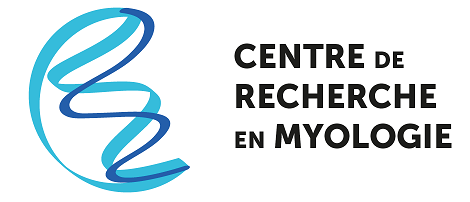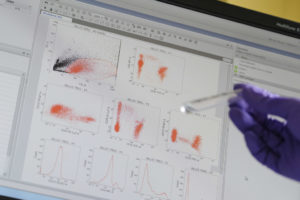A new PhD in our team « Gene therapy for DMD and pathophysiology of skeletal muscle », Massiré Traoré brilliantly defended his thesis on the 7th of September, under the direction of Sestina Falcone.
Skeletal muscle mass maintaining and ageing: the role of Cavβ1
Skeletal muscle atrophy is the result of significant protein breakdown which ultimately leads to a loss of muscle mass and function. However, muscle tissue is capable of activating a molecular response aimed to limit muscle wasting. These mechanisms are still poorly understood. Importantly, one of the key components of this compensatory response had been identified in mice: it is GDF5 (Growth Differentiation Factor 5), a member of the BMPs (Bone Morphogenetic Proteins) family, which plays an essential role in muscle maintenance following denervation. However, the trigger of the compensatory mechanism was unknown.
We hypothesized that a good candidate could be a protein sensitive to electrical activity in skeletal muscle. I focused my study on the protein Cavβ1, which is involved in excitation-contraction coupling and plays a crucial role in the “electrical activity sensor” activity of DHPR, a voltage-dependent calcium channel. My work has revealed the existence of a new embryonic isoform of Cavβ1 (Cavβ1-E) in adult muscle whose expression increases after denervation. The Cavβ1-E protein limits muscle atrophy by triggering gene activation of GDF5 in denervated muscle. Since Cavβ1-E plays a key role in maintaining muscle mass, I became interested in this protein in the context of age-related muscle loss. I observed a decrease in the expression of Cavβ1-E in aged muscle as well as an alteration of the Cavβ1-E/GDF5 axis in response to denervation. These data suggest that these two proteins are essential in the maintenance of muscle mass during aging. In addition, our results point to therapeutic strategies aimed at increasing the expression of Cavβ1-E or GDF5 in aged muscle which could be considered to fight age-related muscle wasting.
Sestina congratulates Massiré:
“Very proud of our new PhD! Massiré is a very brilliant, enthusiastic and proactive scientist. He has greatly contributed to the groundbreaking findings showed in our work and is carrying out a large part of our ongoing preclinical project. As a supervisor, his work within our team has enabled him to validate his experiences with a well-deserved doctorate”

